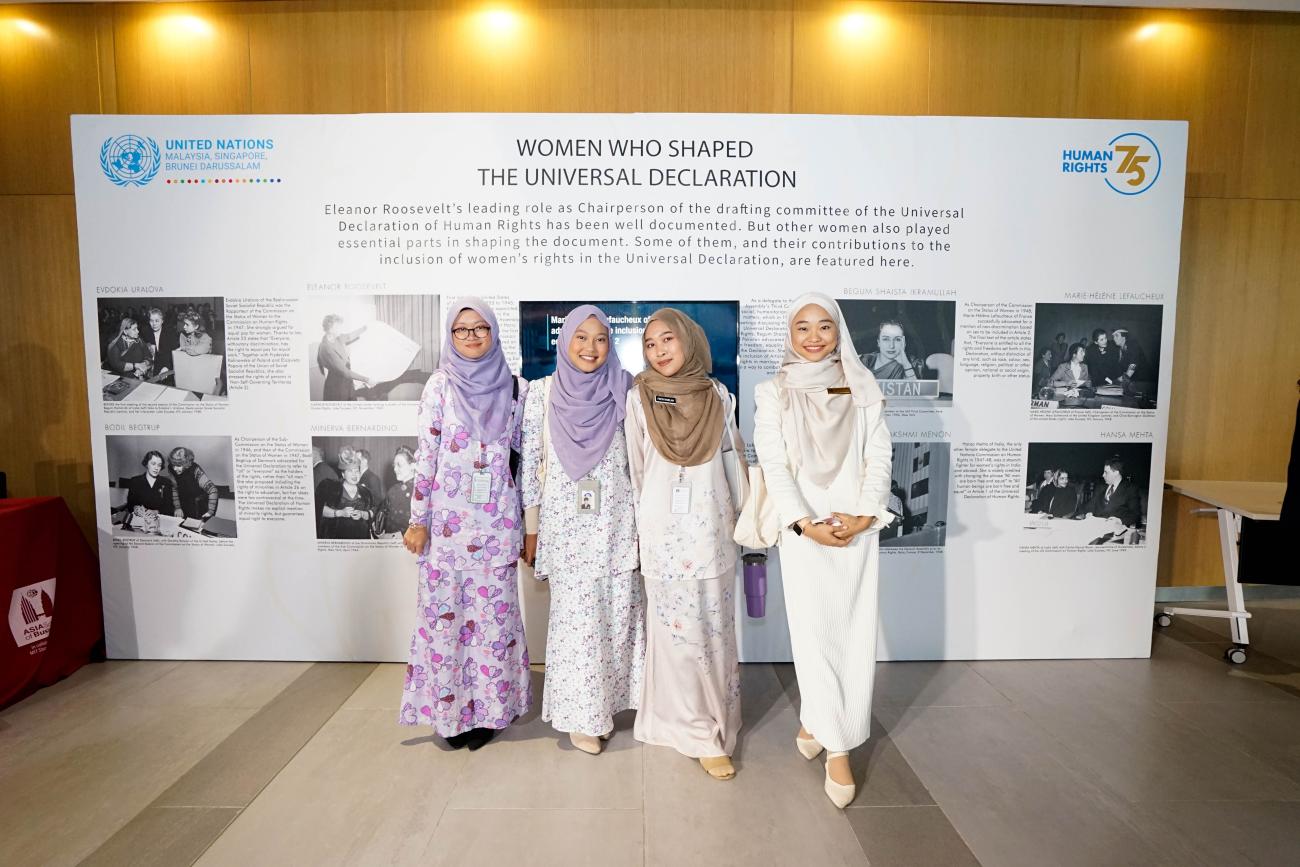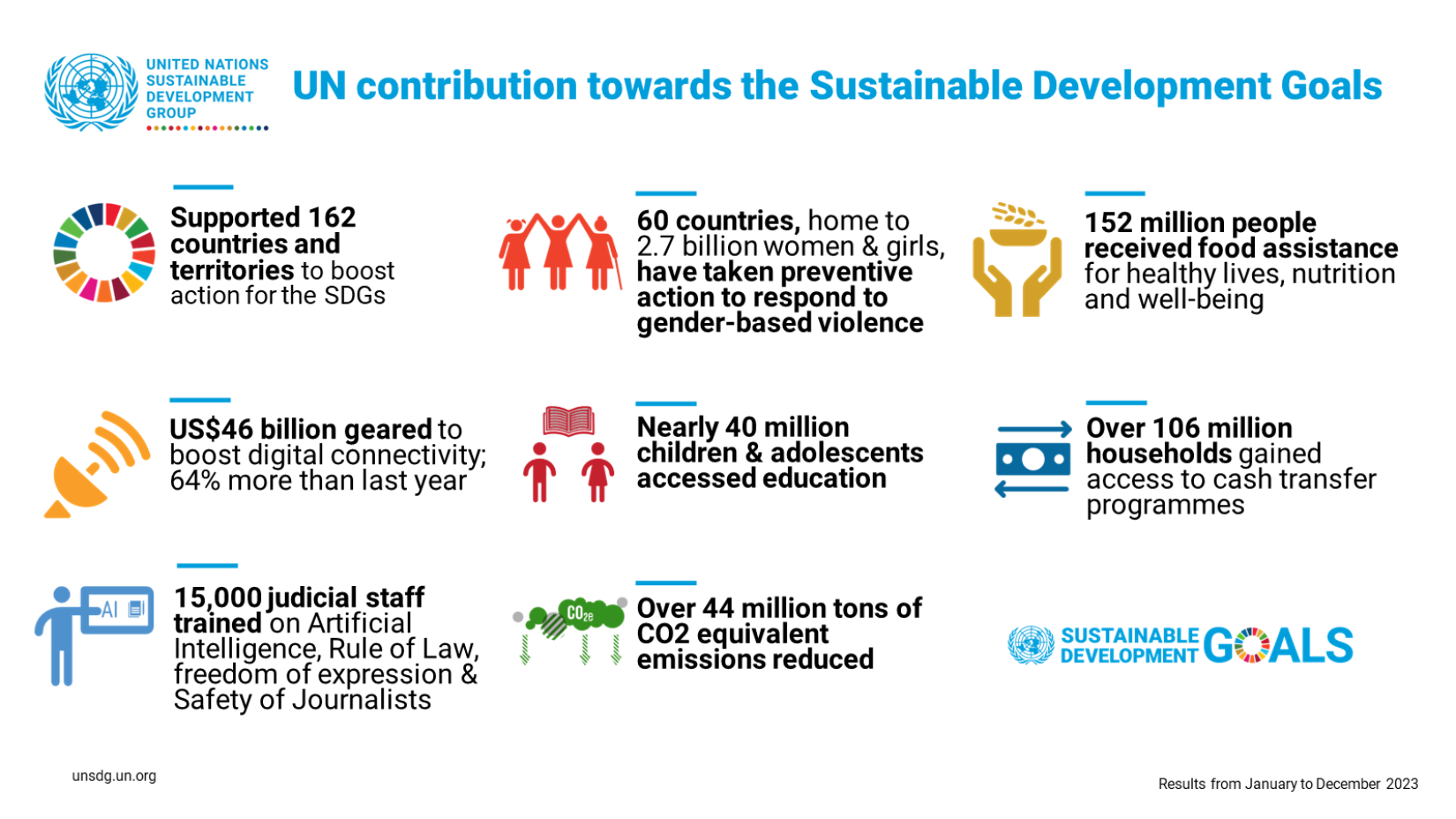Transforming through Turbulence: UN Teams Coordinate for Collective Impact

2024 Report of the UN Sustainable Development Group (UNSDG) Chair
Our planet has been plagued by socio-economic instability, record temperatures and deepening inequalities, worsened by crises and emergencies. The world has witnessed a stagnation in progress on the 2030 Agenda for Sustainable Development, with only 15 per cent of targets set by the Sustainable Development Goals (SDGs) are on track as of 2023. The investment gap to achieve the SDGs jumped from US$2.5 trillion per year before the pandemic to US$4 trillion. To tackle complex challenges, it is crucial to invest in people and planet.
On the ground in 162 countries and territories, UN teams, with revamped development coordination, support governments and people to navigate rough seas of change, accelerating progress and securing world leaders' commitments to the SDGs. Development coordination plays a game-changer role. UN Resident Coordinators (RCs) are using their leadership to make the most of the UN’s offer, with smarter and more catalytic investments and a greater focus on impact, efficiency, transparency and accountability.
Resident Coordinators are helping steer UN teams towards catalyzing progress in key areas such as food systems, sustainable energy, education, digital connectivity, jobs and social protection and climate change, biodiversity loss and pollution that can accelerate progress across the SDGs.
The 2024 Report of the UN Sustainable Development Group (UNSDG) Chair shows that across national, regional and global levels, Resident Coordinators are shaping tailored and integrated support for countries’ unique and complex development challenges. This joined-up approach benefits everyone, from Small Island Developing States to those poised to graduate to higher income and development stages.

Moving away from isolated projects towards a systemic and holistic approach that addresses complex and interlinked challenges, the Resident Coordinators, leading UN teams, are boosting countries SDG acceleration by:
-
Aligning integrated UN policy support to national needs: Resident Coordinators are leading UN teams’ efforts to deliver strategic support tailored to countries’ development needs and priorities. They are shifting UN assistance to collective policy advice for systems transformation. In 26 countries, RCs with their UN teams contributed to the adoption of nearly 500 laws and policies to end violence against women and girls, backed by the EU-UN Global Spotlight Initiative. 94% of host Governments agree that the UN development system adequately provides evidence-based policy advice today.
-
Mobilizing partners: RCs are rallying all stakeholders to support national efforts for people and planet. From financial institutions and the private sector to parliamentarians, youth, women’s groups and academia, Resident Coordinators are bringing together all partners around the Government’s and UN efforts, building coalitions for sustainable development. Today, Resident Coordinators chair or co-chair with the Government a mechanism for coordinating development partners in 98 countries. In Africa, working with the Development Coordination Office regional team and in collaboration with the Office of the Special Coordinator for Development in the Sahel, new programmes were designed for an estimated $70 million, funded by the African Development Bank (AfDB), focusing on gender equality, youth employment, and climate change.
-
Building stronger synergies between development, humanitarian and peacebuilding: Investing in sustainable development remains the surest way to prevent and come out of crises, building long-term resilience even through response and recovery. In the Maldives, the RC led the UN team and the country to embrace the Early Warnings for All initiative, ensuring that all people are reached through multi-hazard early warning systems by 2027. RCs rallied the UN team and partners to tackle floods, wildfires and the impacts of cyclones in South Africa, Tanzania, Vanuatu, Bolivia, Chile and Peru. in 2023. In 57 countries, RCs have steered Peacebuilding Fund-backed initiatives, including 93 new ones totaling US$202 million. In countries like the Democratic Republic of Congo and Mali, with the exit of peacekeeping and stabilization missions, RCs are gearing UN teams to stay and deliver, increasing targeted investments in development, creating spaces for dialogue and providing normative support.
-
Unlocking smart funding for sustainable development: RCs are boosting UN teams’ access to pooled and thematic funding. Steered by RCs, 119 UN teams accessed US$268 million in Joint SDG Fund financial commitments across 236 joint programmes with 31 UN entities. In Mexico, this work led to the adoption of a National Care Systems Law, benefiting an estimated 46 million people by 2030. In Timor-Leste, the Fund allowed the Government to establish a scheme that allocates US$80 million for locally sourced food basket schemes, boosting demand for local production while feeding the hungry. In Uganda, the Fund’s resources, alongside US$13.5 million from the Government, boosted the Uganda Development Bank’s facility for concessional financing for climate-smart agriculture, climate-resilient infrastructure, and low-carbon industries.
- Ensuring accountability for results and boosting efficiencies: UN teams’ achievements are now more transparent to national Governments and the people we serve. All Resident Coordinator Offices (RCOs) today produce, with their UN teams, an annual results report. Digital platforms like UN INFO and UNCT websites in more than 130 countries, showcase UN teams' activities, partners, funding and results on the SDGs. Eight common premises were established in 2023 and 43 are underway, enabling UN teams to work better together. The first UN common back-office was established in Nairobi, offering 101 services to over 3,500 staff from more than 60 UN entities; similar efforts are underway in Tanzania, Brazil, Viet Nam and Senegal. These efforts unleash savings for UN entities, which are being invested in development initiatives, serving the needs of communities.
With the Summit of the Future on the horizon, all eyes are on countries to demonstrate greater ambition and action for the SDGs. An effective and cohesive UN is fundamental to boost results and impact for people and the planet. More investments are needed. The Resident Coordinator system faces a US$54 million funding gap. A fully funded and fit-for-purpose RC system is pivotal for the whole UN family, to better support countries to accelerate the SDGs. There is no time to lose.
Read the 2024 UNSDG Chair Report here.

















